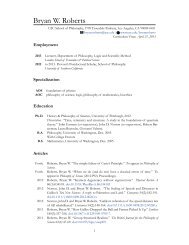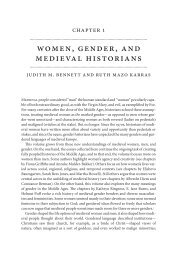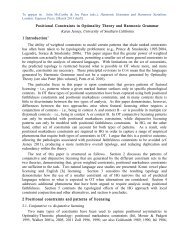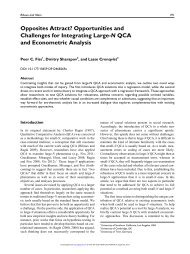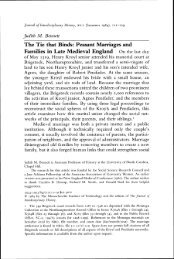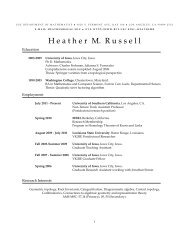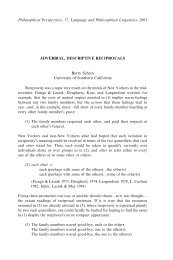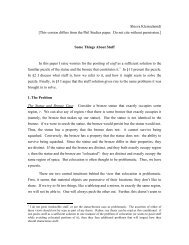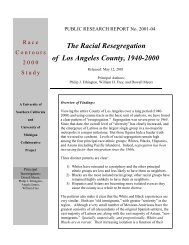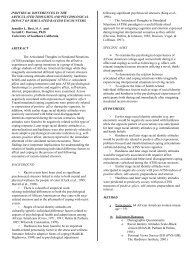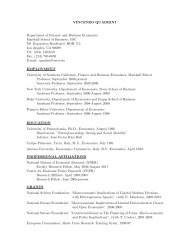The Diffusion of Ideas over Contested Terrain - Personal World Wide ...
The Diffusion of Ideas over Contested Terrain - Personal World Wide ...
The Diffusion of Ideas over Contested Terrain - Personal World Wide ...
You also want an ePaper? Increase the reach of your titles
YUMPU automatically turns print PDFs into web optimized ePapers that Google loves.
11<br />
Regarding the question <strong>of</strong> whether a<br />
firm’s shareholder value orientation<br />
espousal might influence which institutions<br />
elect to own stock in that firm, it<br />
appears unlikely that such reciprocal<br />
causality should affect our findings. First,<br />
equity ownership structures, and particularly<br />
large blockholdings, have been<br />
remarkably stable in Germany throughout<br />
the 1990s (e.g., Kogut and Walker, 2001;<br />
Jackson, Höpner, and Kurdelbusch, 2004;<br />
Fohlin, 2005). Second, reverse causality is<br />
less <strong>of</strong> a concern because our models are<br />
lagged, so ownership in one year predicts<br />
espousal in the following year.<br />
#2144-ASQ V49 N4-December 2005—file: 49401-fiss<br />
reported here) in which we divided German bank holdings<br />
into those controlled by the Big Three (Deutsche Bank, Commerzbank,<br />
and Dresdner Bank) and those controlled by all<br />
other banks. <strong>The</strong>se analyses showed that the positive effect<br />
predicted in H1a is almost entirely driven by the Big Three,<br />
pointing to the importance <strong>of</strong> these biggest German banks in<br />
affecting the decision <strong>of</strong> portfolio firms to themselves<br />
announce a change to shareholder-oriented g<strong>over</strong>nance.<br />
Given that these are the leading banks in Germany, it is not<br />
surprising that their espousal <strong>of</strong> a shareholder value orientation<br />
typically preceded espousal by other banks. Thus,<br />
although other espousing banks also had shareholdings, the<br />
firms in which they had holdings <strong>of</strong>ten had already adopted a<br />
shareholder value orientation and were thus dropped from<br />
the analysis.<br />
H1b predicted that blockholding by domestic non-financial<br />
firms that had themselves espoused a shareholder value orientation<br />
would likewise have a positive effect on shareholder<br />
value orientation adoption. We again find support for this<br />
hypothesis, with the same pattern <strong>of</strong> significance as for<br />
banks. As shown in the models, firm ownership is a significant<br />
predictor <strong>of</strong> shareholder value espousal only if the parent<br />
firm itself advocated shareholder value management,<br />
pointing again to the heterogeneity <strong>of</strong> interests within this<br />
owner category. 11<br />
Regarding the two groups <strong>of</strong> non-corporate actors, we find<br />
support for hypothesis H1c, which proposed a positive effect<br />
for ownership by pro-business federal and state g<strong>over</strong>nments.<br />
H1d, which predicted that ownership by families<br />
beyond the founder’s generation would affect adoption <strong>of</strong> a<br />
shareholder value orientation, was not supported. Though the<br />
coefficient for family ownership <strong>of</strong> the third and later generation<br />
is in the predicted direction, it is only marginally significant<br />
in models 5 and 6 and not significant in the fully specified<br />
model 9.<br />
Results for the managerial demographics variables also <strong>of</strong>fer<br />
support for a diffusion model that emphasizes the role <strong>of</strong> key<br />
corporate elites and their preferences. H2a, which posited a<br />
positive effect <strong>of</strong> a CEO’s educational background in economics<br />
and law on shareholder value orientation adoption, was<br />
supported, as shown in models 7 through 9. Although the<br />
results do not show a significant main effect for CEO age as<br />
proposed in H3b, we do observe a significant interaction<br />
effect for CEO educational background and age. <strong>The</strong>se findings<br />
indicate that being g<strong>over</strong>ned by a younger CEO with a<br />
background in economics or law makes German firms significantly<br />
more likely to espouse a shareholder value orientation.<br />
<strong>The</strong> results for the control variables show no support for the<br />
argument that it is primarily market pressures that move German<br />
firms to adopt a shareholder value approach. Neither<br />
reliance on the stock market for firm financing nor exposure<br />
to international product markets is a significant predictor <strong>of</strong><br />
shareholder value orientation espousal. <strong>The</strong>re is also little evidence<br />
that the market for corporate control or blockholdings<br />
by other institutional investors significantly affect the decision<br />
522/ASQ, December 2004



